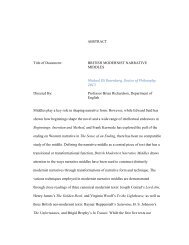PSYCHOTHERAPY ENGAGERS VERSUS NON-ENGAGERS
PSYCHOTHERAPY ENGAGERS VERSUS NON-ENGAGERS
PSYCHOTHERAPY ENGAGERS VERSUS NON-ENGAGERS
You also want an ePaper? Increase the reach of your titles
YUMPU automatically turns print PDFs into web optimized ePapers that Google loves.
therapists (Hill & Lent, 2006), that therapists in training seem to have more difficulty<br />
retaining clients than do professional clinicians (Tryon 1989a, 1989b), and that only one<br />
study has been conducted thus far on helping skills and dropout (Tryon, 2003). Since<br />
only one study has been conducted thus far on helping skills and dropout, therapists-in-<br />
training, as well as those providing therapy training, have little guidance as to what<br />
helping skills may or may not be helpful for preventing dropout, or even what helping<br />
skills patterns are associated with dropout. Thus, the investigation of the timing and<br />
patterns of verbal helping skills in relation to psychotherapy dropout may help therapists<br />
to understand patterns of helping skills associated with dropout and to better prevent<br />
dropout.<br />
Tryon (2003) began investigating the topic of therapist helping skills associated<br />
with a type of dropout referred to as ‘engagement.’ Engagement refers to the<br />
phenomenon of a client returning for therapy after the initial intake session (Tryon,<br />
1985). In Tryon (2003), a ‘non-engager’ was defined as a client who failed to return for<br />
therapy after the initial intake session, whereas an ‘engager’ was defined as a client who<br />
returned for at least one therapy session after the intake session. In the present study, I<br />
use the terms ‘engagement’ and ‘non-engager’ based on Tryon’s (1985, 2003)<br />
definitions, but use the term ‘engager’ to refer to clients who continue therapy beyond<br />
eight sessions, in order to more sharply distinguish the intake-only dropouts from their<br />
counterparts.<br />
Tryon (2003) found that therapists used less information-giving and more<br />
minimal encouragers during the intake session for non-engagers than compared to<br />
engagers. Tryon also found statistically significant differences between engagers<br />
2

















